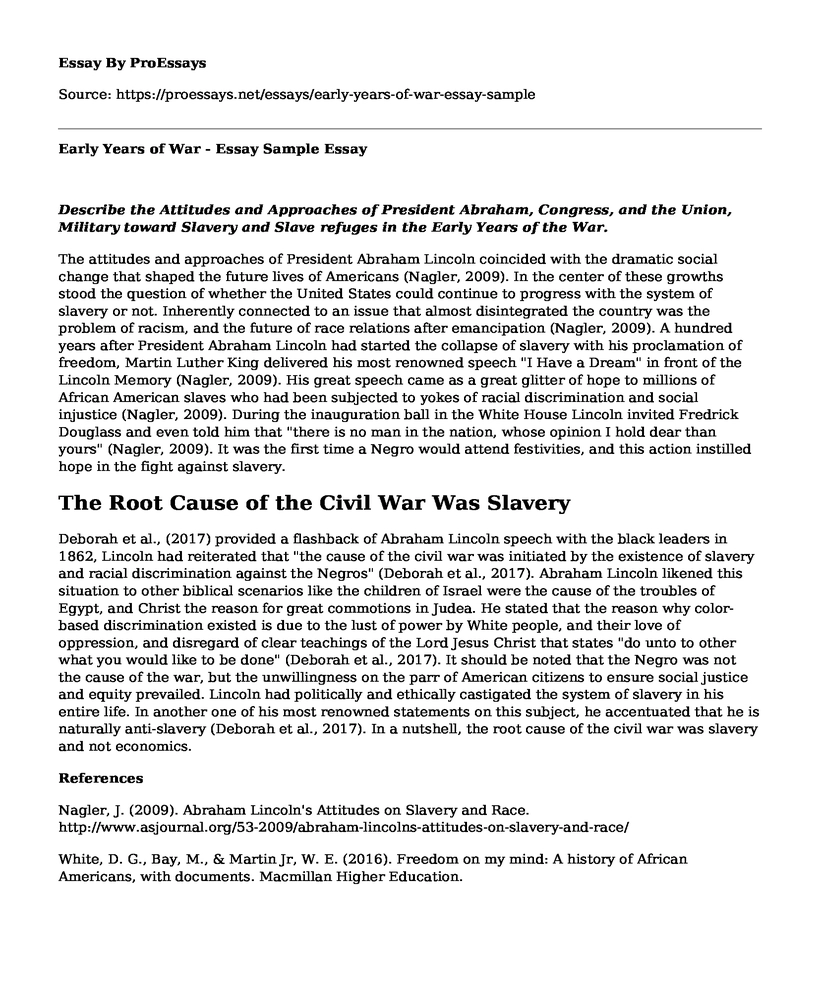Describe the Attitudes and Approaches of President Abraham, Congress, and the Union, Military toward Slavery and Slave refuges in the Early Years of the War.
The attitudes and approaches of President Abraham Lincoln coincided with the dramatic social change that shaped the future lives of Americans (Nagler, 2009). In the center of these growths stood the question of whether the United States could continue to progress with the system of slavery or not. Inherently connected to an issue that almost disintegrated the country was the problem of racism, and the future of race relations after emancipation (Nagler, 2009). A hundred years after President Abraham Lincoln had started the collapse of slavery with his proclamation of freedom, Martin Luther King delivered his most renowned speech "I Have a Dream" in front of the Lincoln Memory (Nagler, 2009). His great speech came as a great glitter of hope to millions of African American slaves who had been subjected to yokes of racial discrimination and social injustice (Nagler, 2009). During the inauguration ball in the White House Lincoln invited Fredrick Douglass and even told him that "there is no man in the nation, whose opinion I hold dear than yours" (Nagler, 2009). It was the first time a Negro would attend festivities, and this action instilled hope in the fight against slavery.
The Root Cause of the Civil War Was Slavery
Deborah et al., (2017) provided a flashback of Abraham Lincoln speech with the black leaders in 1862, Lincoln had reiterated that "the cause of the civil war was initiated by the existence of slavery and racial discrimination against the Negros" (Deborah et al., 2017). Abraham Lincoln likened this situation to other biblical scenarios like the children of Israel were the cause of the troubles of Egypt, and Christ the reason for great commotions in Judea. He stated that the reason why color-based discrimination existed is due to the lust of power by White people, and their love of oppression, and disregard of clear teachings of the Lord Jesus Christ that states "do unto to other what you would like to be done" (Deborah et al., 2017). It should be noted that the Negro was not the cause of the war, but the unwillingness on the parr of American citizens to ensure social justice and equity prevailed. Lincoln had politically and ethically castigated the system of slavery in his entire life. In another one of his most renowned statements on this subject, he accentuated that he is naturally anti-slavery (Deborah et al., 2017). In a nutshell, the root cause of the civil war was slavery and not economics.
References
Nagler, J. (2009). Abraham Lincoln's Attitudes on Slavery and Race. http://www.asjournal.org/53-2009/abraham-lincolns-attitudes-on-slavery-and-race/
White, D. G., Bay, M., & Martin Jr, W. E. (2016). Freedom on my mind: A history of African Americans, with documents. Macmillan Higher Education.
Cite this page
Early Years of War - Essay Sample. (2023, May 12). Retrieved from https://proessays.net/essays/early-years-of-war-essay-sample
If you are the original author of this essay and no longer wish to have it published on the ProEssays website, please click below to request its removal:
- The Role of Women in American Civil Wars Essay
- Thomas Jefferson Vs. Alexander Hamilton Essay
- New World Traditions and Slavery Paper Example
- The Classical Age of World History (500BCE-500CE): Greece, China and India Essay
- An Analysis of a Historical Map: The Map of the Gold Regions by James Wyld
- French Colonialism & Nigerian Independence Movements - Essay Sample
- Paper Example on Rafe & Danny: Best Friends in War-Torn Times







